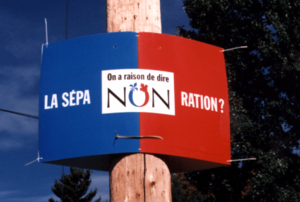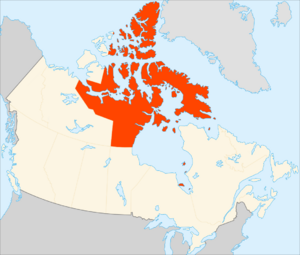History of Canada (1982–present) facts for kids
| 1982–present | |

The "No" sign, during the 1995 Quebec referendum
|
|
| Preceded by | History of Canada (1960–1981) |
|---|---|
| Monarch | Elizabeth II Charles III |
| Leader(s) | |
The history of Canada (1982–present) covers the time from the Canada Act in 1982 until today. This period saw Canada become fully independent. It also brought new laws to protect people's rights. Many important events happened, like big elections and changes in how Canada works with other countries.
Contents
Canada's Big Step: The Canada Act (1982)
In 1982, something very important happened for Canada. The Canada Act was passed by the British Parliament. Queen Elizabeth II approved it on March 29. At the same time, the Constitution Act was passed by the Canadian Parliament. The Queen approved this one on April 17.
This meant Canada's main rulebook, its Constitution, was finally brought home. Before this, the Constitution was a British law. Now, Canada was truly in charge of its own laws. The Queen's role as Canada's monarch became separate from her role as the British monarch.
A new part was added to the Constitution called the Canadian Charter of Rights and Freedoms. This Charter protects the rights and freedoms of all Canadians. Some leaders from Quebec were not happy with how parts of this new law were discussed. This led to some disagreements.
Mulroney's Time: 1984 to 1993
Brian Mulroney became Prime Minister in 1984. He worked to make Canada's relationship with the United States stronger. A big goal for him was to create free trade with the US. This meant it would be easier to buy and sell goods between the two countries. The Canada-United States Free Trade Agreement was signed in 1988.
Mulroney also tried to solve issues with Quebec. In 1987, he tried to create the Meech Lake Accord. This was a plan to change the Constitution so Quebec would accept it. But this plan did not get approved by all provinces.
In 1989, Mulroney's government suggested a new sales tax. This was called the GST. Many Canadians did not like this idea. Despite protests, the GST started on January 1, 1991. This tax made Mulroney's government very unpopular.
Air India Disaster
On June 23, 1985, a terrible event happened. Air India Flight 182 exploded high above the Atlantic Ocean. All 329 people on board died. This included 82 children and 280 Canadian citizens. This was the deadliest terrorist attack involving an aircraft before September 11, 2001. It is also the largest mass murder in Canadian history.
Oka Crisis
The Oka Crisis was a land dispute in Quebec in 1990. It was between the Mohawk nation and the town of Oka, Quebec. The conflict lasted from July to September. Three people died during this time. This event showed the tensions between Indigenous people and the Canadian government.
Canada in the Gulf War
Canada quickly spoke out against Iraq's invasion of Kuwait in 1990. Canada joined a group of countries led by the US. When the United Nations allowed force in the 1991 Gulf War, Canada sent warships, fighter jets, and medical teams. This was the first time Canadian forces fought in a war since the Korean War. Canada did not lose any soldiers in this conflict.
Atlantic Cod Fishing Stops
In 1992, a major change happened for fishing in Atlantic Canada. Prime Minister Mulroney's government stopped cod fishing in the northwestern Atlantic. This was because the number of cod fish had dropped very low. Fishing had been a huge part of the Newfoundland and Labrador economy for 500 years. This decision caused 35,000 people to lose their jobs. It was the biggest single-day job loss in Canadian history.
Mulroney Steps Down
The failure of the Meech Lake Accord and the unpopular GST made Mulroney's government very unpopular. Canada also faced a difficult economic time in the late 1980s and early 1990s. Because of these challenges, Brian Mulroney resigned in 1993. Kim Campbell took over as Prime Minister for a short time. She was Canada's first, and so far only, female prime minister.
Chrétien's Time: 1993 to 2003
Jean Chrétien became Prime Minister in 1993. He had promised to get rid of the GST, but this was not possible due to Canada's economic situation. By 1995, Canada had fixed its budget problems. It was the only G7 country at the time to have extra money in its budget.
Chrétien's government faced debates about Canada's health care system. They also reduced military spending. Canada did not play as big a role in UN peacekeeping as it used to. Chrétien decided not to send Canadian soldiers to the 2003 invasion of Iraq. Many people praised him for keeping Canada out of that war.
The Turbot War
In the 1990s, Canada had a fishing dispute with the European Union. This was called the "Turbot War." Canada believed European fishing boats were catching too many fish outside Canada's waters. In 1995, Canadian officials boarded a Spanish fishing boat called the Estai. They arrested its crew in international waters.
Canada said the Spanish ship was using a net with holes that were too small. This meant they were catching young fish. The large net was even displayed in New York City to show the world. Spain argued that Canada had no right to arrest their ship. The case went to the International Court of Justice, but the court did not hear it.
Quebec's 1995 Referendum
In October 1995, Quebec held another vote on whether to become a separate country. This was Canada's second such referendum. Groups that wanted Quebec to separate campaigned hard. Groups that wanted Quebec to stay in Canada also campaigned hard. The question on the ballot was long and confusing for some.
After a lot of campaigning, the referendum was very close. Those who wanted Quebec to stay in Canada won by a very small margin. About 50.58% of people voted to stay.
In 1982, people in the Northwest Territories voted to divide the area. The Canadian government agreed to this idea. After many talks with the Inuit people, an agreement was reached in 1992. In 1993, new laws were passed by the Canadian Parliament. Finally, on April 1, 1999, the new territory of Nunavut was officially created. Nunavut is a large territory in northern Canada.
Canada's Peacekeeping Role
After the Cold War ended, there were many more international peacekeeping missions. Canada often took part in these missions. In the 1990s, Canadians helped with UN peacekeeping in places like Western Sahara, Cambodia, and Haiti. They also helped in East Timor and Sierra Leone.
Martin's Time: 2003 to 2006
Jean Chrétien resigned at the end of 2003. In 2004, a report showed that $100 million was not handled properly by government officials. This became known as the Sponsorship Scandal.
Because of this scandal, the Liberal Party, now led by Paul Martin, lost its majority in the 2004 election. They still formed a minority government. This means they had fewer seats than all other parties combined. During this time, Canada passed a law to make same-sex marriage legal. In November 2005, the Liberal government lost a vote of confidence. This led to another election after only two years.
Harper's Time: 2006 to 2015
Stephen Harper and his Conservative Party won minority governments in 2006 and 2008. In December 2008, there was a political disagreement. The Liberal and New Democratic Party leaders tried to form a coalition government. This would have removed Harper's government. However, the Governor General stopped Parliament from meeting. This avoided the vote.
Harper's minority governments ended on May 2, 2011. His Conservative party won a majority of seats in the election. This meant they had more than half the seats in Parliament. The New Democratic Party became the official opposition. The Liberal Party finished third for the first time in its history.
Trudeau's Time: 2015 to Present
In October 2015, Justin Trudeau became Prime Minister. His Liberal Party won a majority of seats in the election.
In 2019, there were reports that Trudeau's government put pressure on the attorney general. This was called the SNC-Lavalin affair. Despite this, Trudeau won the 2019 election. However, his party won a minority of seats this time.
The COVID-19 pandemic reached Canada in early 2020. By March, all provinces and territories declared emergencies. As of June 2022, Canada had reported 41,000 COVID-19 related deaths.
Trudeau called an early election in 2021. He hoped to win a majority government. But the Liberal party kept its minority number of seats.
See also
- First Nations
- History of Canada
- Meech Lake Accord
 | Charles R. Drew |
 | Benjamin Banneker |
 | Jane C. Wright |
 | Roger Arliner Young |


